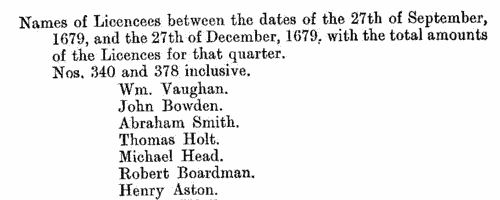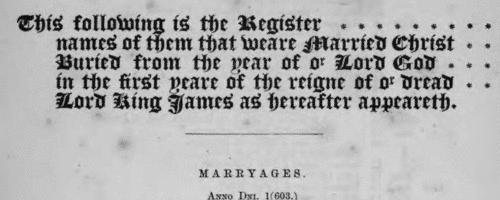Hobbes Surname Ancestry ResultsOur indexes 1000-1999 include entries for the spelling 'hobbes'. In the period you have requested, we have the following 116 records (displaying 51 to 60): Single Surname Subscription | | | Buying all 116 results of this search individually would cost £568.00. But you can have free access to all 116 records for a year, to view, to save and print, for £100. Save £468.00. More... |
These sample scans are from the original record. You will get scans of the full pages or articles where the surname you searched for has been found. Your web browser may prevent the sample windows from opening; in this case please change your browser settings to allow pop-up windows from this site. Official Papers
(1671)
The State Papers Domestic cover all manner of business relating to Britain, Ireland and the colonies, conducted in the office of the Secretary of State as well as other miscellaneous records. Includes lists of passes to travel abroad.
HOBBES. Cost: £4.00.  | Sample scan, click to enlarge

| Official Papers
(1676-1677)
The State Papers Domestic cover all manner of business relating to Britain, Ireland and the colonies, conducted in the office of the Secretary of State as well as other miscellaneous records, including lists of passes to travel abroad. This edition by F. H. Blackburne Daniell, covers the period from 1 March 1676 to 28 February 1677, and was published in 1909.
HOBBES. Cost: £4.00.  | Sample scan, click to enlarge

| Allegations for marriages in southern England
(1669-1679)
The province or archbishopric of Canterbury covered all England and Wales except for the northern counties in the four dioceses of the archbishopric of York (York, Durham, Chester and Carlisle). Marriage licences were generally issued by the local dioceses, but above them was the jurisdiction of the archbishop, exercised through his vicar-general. Where the prospective bride and groom were from different dioceses it would be expected that they obtain a licence from the archbishop; in practice, the archbishop residing at Lambeth, and the actual offices of the province being in London, which was itself split into myriad ecclesiastical jurisdictions, and spilled into adjoining dioceses, this facility was particularly resorted to by couples from London and the home counties, although there are quite a few entries referring to parties from further afield. The abstracts of the allegations given here usually state name, address (street in London, or parish), age, and condition of bride and groom; and sometimes the name, address and occupation of the friend or relative filing the occupation. Where parental consent was necessary, a mother's or father's name may be given. The ages shown should be treated with caution; ages above 21 tended to be reduced, doubtless for cosmetic reasons; ages under 21 tended to be increased, particularly to avoid requiring parental consent; a simple statement 'aged 21' may merely mean 'of full age' and indicate any age from 21 upwards. These are merely allegations to obtain licences; although nearly all will have resulted in the issuing of the licence, many licences did not then result in marriage. HOBBES. Cost: £4.00.  | Sample scan, click to enlarge

| Official Papers
(1660-1681)
The State Papers Domestic cover all manner of business relating to Britain, Ireland and the colonies, conducted in the office of the Secretary of State as well as other miscellaneous records. HOBBES. Cost: £4.00.  | Sample scan, click to enlarge

| Letters and papers of James first duke of Ormond, Lord Deputy of Ireland
(1675-1685)
This correspondence deals with a large variety of personal and public affairs in Ireland and England. The collection also includes lists of Irish wool licences and licencees, 1678 to 1681HOBBES. Cost: £4.00.  | Sample scan, click to enlarge

| Boys at Eton
(1441-1698)
King Henry VI founded a college at Eton in Buckinghamshire in 1440, 'to the praise, glory and honour of the Crucified, the exaltation of the most glorious Virgin His mother, and the establishing of holy Church His bride'. From this foundation has evolved the modern public school. Sir Wasey Sterry compiled a register for the college from 1441 to 1698, from a variety of surviving records, and including groundwork from his 'A List of Eton Commensals' of 1904, and R. A. Austen-Leigh's 'A List of Eton Collegers' of 1905. This resulting 'Eton College Register' was published in 1943. Because of the variety of underlying materials, the entries vary greatly in depth: some names survive only as a surname of not too certain date. In the fullest entries, the surname (often with a variant spelling) is given first, in bold, followed by the years of entry and leaving. The christian name is given next; then birthplace, and name of father. The initials K. S. (King's Scholar) indicate a scholar on the foundation. There will then follow a summary of the man's career, death, burial and probate; and the sources for the information, in italics, at the end of the entry.HOBBES. Cost: £4.00.  | Sample scan, click to enlarge

| Official Papers
(1698)
The State Papers Domestic cover all manner of business relating to Britain, Ireland and the colonies, conducted in the office of the Secretary of State as well as other miscellaneous records. Includes lists of passes to travel abroad.
HOBBES. Cost: £4.00.  | Sample scan, click to enlarge

| Hertfordshire Sessions
(1581-1700)
Incidents from the Hertfordshire Sessions Rolls. These cover a wide range of criminal and civil business for the county, with presentments, petitions, and recognizances to appear as witnesses: many of the records concern the county authorities dealing with regulation of alehouses, religious conventicles, absence from church, highways, poaching, profanation of the Sabbath, exercising trades without due apprenticeship &c. Unlike the Sessions Books, the decisions of the justices are not recorded on the rolls, which serve more as a record of evidence and allegations. Where the date of a roll is given with an asterisk, it indicates that that particular document was not then in the county muniments, but in the archives of the Marquess of Salisbury (whose ancestors had served as Custos Rotulorum) at Hatfield House. This is a calendar of abstracts of extracts: it is by no means a completely comprehensive record of the surviving Hertfordshire sessions rolls of the period, but coverage is good. HOBBES. Cost: £4.00.  | Sample scan, click to enlarge

|  Masters and Apprentices
(1745) Masters and Apprentices
(1745)
Apprenticeship indentures and clerks' articles were subject to a 6d or 12d per pound stamp duty: the registers of the payments usually give the master's trade, address, and occupation, and the apprentice's father's name and address, as well as details of the date and length of the apprenticeship.HOBBES. Cost: £8.00.  | Sample scan, click to enlarge

| Wandsworth Burials
(1758)
The ancient parish of Wandsworth in Surrey comprised the single township of Wandsworth, including the hamlets of Garratt, Half Farthing and Summers Town. It lay in the archdeaconry of Surrey of the diocese of Winchester: unfortunately, few bishop's transcripts of Surrey parish registers survive earlier than 1800. Although the original parish registers of Wandsworth doubtless commenced in 1538, the volume(s) before 1603 had been lost by the 19th century. In 1889 a careful transcript by John Traviss Squire of the first three surviving registers was printed, and we have now indexed it year by year. The early burial registers contain little detail - date of burial, and full name. For the burial of children, the father's name is also stated; for the burial of wives, the husband's. Such details as date or cause of death, age, address or occupation are almost never given. The burial registers are considerably more bulky than the baptism registers, because the burying ground was used by Dissenters, who formed a large part of the population. These include a French Protestant congregation that worshipped in a church (the registers of which do not survive) in a courtyard immediately opposite the parish church. The Quakers had a cemetery of their own. The 18th-century burial registers also include a surprising number of children sent out to Wandsworth from London to nurse.HOBBES. Cost: £4.00.  | Sample scan, click to enlarge

|
Research your ancestry, family history, genealogy and one-name study by direct access to original records and archives indexed by surname.
|













